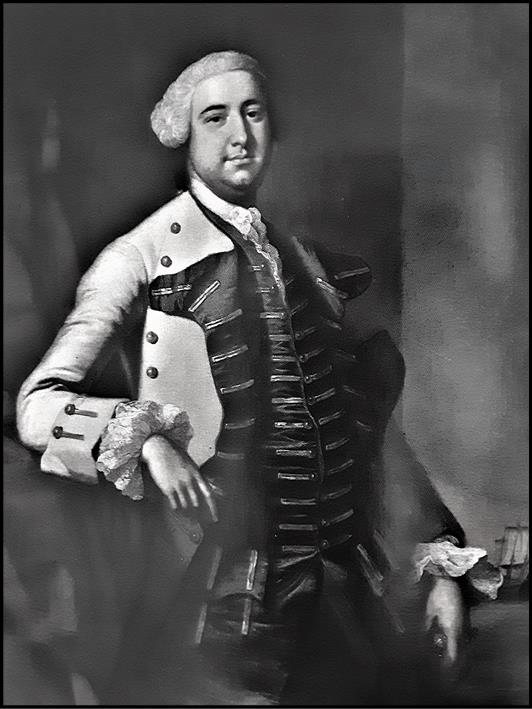General George Augustus Eliott, Lord Heathfield, the defender of Gibraltar and one of the most celebrated members of the Elliot Clan, was the eighth surviving son of the 3rd Baronet of Stobs and his wife Eleanor Elliot. He was born 25 December 1717 at Wells House, near Stobs, Roxburghshire, Scotland. Eliott was a teetotaller and vegetarian. It was recorded that he “never touched strong liquor or meat, but lived chiefly on vegetables, simple puddings, and water”. He did not sleep for more than four hours at a time.
Most of his childhood was spent at Stobs and he was, like his brothers, educated at home. He went to Leyden University at a very early age, and before he was seventeen, George Augustus had passed out of the famous military academy of La Fere in Picardy and had done two years’ service with the Prussian army. In 1739, on reaching the age of twenty-two, he obtained his warrant at Woolwich as a cadet gunner and was given a cornetcy in the 2nd (Scots) Troop of Horse Grenadiers by his uncle, William Elliot of Wells, then a major in that regiment.
George Augustus rose rapidly in the service and gained distinction both as a cavalry officer and as an engineer. He served throughout the War of the Austrian Succession, being wounded at the battles of Dettingen and Fontenoy in 1743.
and gained distinction both as a cavalry officer and as an engineer. He served throughout the War of the Austrian Succession, being wounded at the battles of Dettingen and Fontenoy in 1743.
In 1747, on rumors of a French invasion, George Augustus was recalled from the Continent and sent to Sheerness to build up the defenses of the Medway. Hostilities were concluded the following year at Aix-la-Chapelle and for nearly a decade there was a lull in the fighting in Europe.
The Seven Years War, which began in 1756, was waged by Prussia and England against a coalition of powers led by France. Although the army of Frederick the Great was the most professional in Europe, Prussia was threatened on all sides by countries whose joint populations outnumbered it by twenty to one and little help was at first received from the fumbling government at Westminster. But the emergence of William Pitt (the younger) as the guiding spirit of the administration soon inspired England’s efforts. Pitt saw that the way to end the rivalry of the French in the colonies was to keep France engaged in Europe while England’s fleet swept the seas. British forces and British money were therefore raised to assist Prussia on the Continent while French possessions were attacked in every quarter of the globe.
missioned in 1759 to raise a new light cavalry regiment for service in Hanover (which covered Prussia’s western border with France.) Although this regiment was officially named the 15th Light Horse and was modeled on the Prussian Hussars, it was better known as “Eliott’s Horse” and, indeed, in many respects resembled the Border riders of George Augustus’ ancestors. The regiment fought through the campaign in Germany in 1760 and 1761 with great distinction and soon became famous, receiving the special approbation of Prince Ferdinand of Brunswick, the victor of Minden. Smollett records their part in the battle of Emsdorf in July 1760: “Eliott’s regiment signalized themselves by repeated charges. Though this was the first time they had appeared in the field the regiment performed wonders. They charged five times . . . . . and captured 500 prisoners and 9 sets of colours.”
Pitt’s policy of keeping the French occupied in Europe while the British forces attacked their possessions had proved highly successful. By 1760 both Canada and India had fallen to the British and the Royal Navy ruled the seas. When, in 1762, Spain came to the aid of France, Britain was in a position to promptly mount attacks on the Spanish colonies in Cuba and the Philippines. George Augustus, now a major-general, was recalled from Germany and appointed 2nd in command of an expedition under the Earl of Albemarle for the capture of Havana, the capital city of Cuba and the center of Spanish power in the Caribbean. The capture of Havana was the largest, the most complex, and perhaps the most difficult campaign undertaken by the British in America during the Seven Years War. It was not accomplished without considerable loss, mainly from disease. But the attack was completely successful, and the treasure taken from Havana was estimated at 3,000,000 pounds. George Augustus’ share of the prize money was amounted to 24,539.10.1 pounds. Out of this sum he purchased the estate of Heathfield in Sussex, from which he later took his title.
Unfortunately, the benefits of the brilliant victories at Quebec, Quiberon Bay, India and the West Indies were for the most part cast away by the Peace of Paris in 1763. Despite the remonstrances of Pitt, France was left with her naval power untouched; Havana, which controlled the maritime strategy of the Caribbean, was restored to Spain; Frederick of Prussia who, as Nancy Mitford puts it, “had won Canada and India for England on the battlefields of Germany,” was deserted and his subsidy withdrawn. Appeasement and conciliation